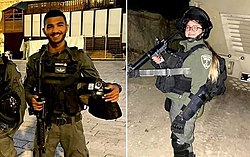Aftermath
Hamas, Hezbollah, and the Palestinian Islamic Jihad praised the attack, but they did not take responsibility. [10] [11] [12]
The funerals of Yazan Falah and Shirel Abukarat took place the following day. Thousands of people, including politicians and senior police officials, attended both funerals. Falah, an Israeli Druze, was buried in the military cemetery of Kisra-Sumei, his hometown. Public Security Minister Omer Bar-Lev, Justice Minister Gideon Sa'ar, and Mowafaq Tarif, the spiritual leader of Israel's Druze community, were in attendance. Abukarat, a French-Israeli, was buried at the military cemetery of her hometown of Netanya. Tourism Minister Yoel Razvozov and Netanya mayor Miriam Feirberg attended the funeral. [13]
The Foreign Ministers of the four Arab countries attending the Negev Summit condemned the attack. [14] Antony Blinken, who was visiting Israel when the attack happened, tweeted that "senseless acts of violence and murder have no place in society". [15]
The Islamic State claimed responsibility for the attack later that day via Amaq News Agency, making it the first time ISIL had claimed responsibility for an attack in Israel since June 2017 Jerusalem attack. [16] [17] Omer Bar-Lev said that police would be "deploy[ed] in all areas", describing it as a major security threat. [17] Five people suspected of having ties to the attackers were arrested by police. [18]
The Times of Israel reported that Umm al-Fahm municipality's Facebook page had posted an entry mourning the Ighbariahs' deaths. Mayor Samir Subhi Mahameed apologised and stated that the post was made by an outside firm that runs the city's social media accounts. He announced his resignation shortly after the incident, but then changed track and decided not to quit. [19] [20]
This page is based on this
Wikipedia article Text is available under the
CC BY-SA 4.0 license; additional terms may apply.
Images, videos and audio are available under their respective licenses.


